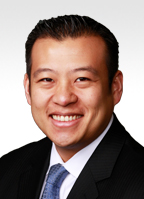 On December 5,
2012, Matthew Y.C. Lin, M.D., now
a faculty member at UCSF in the Department of Surgery, Division of
General Surgery, sat down for a Q&A session where he
discussed his experiences as an MIS/Bariatric surgical fellow at
UCSF and its impact on his career.
On December 5,
2012, Matthew Y.C. Lin, M.D., now
a faculty member at UCSF in the Department of Surgery, Division of
General Surgery, sat down for a Q&A session where he
discussed his experiences as an MIS/Bariatric surgical fellow at
UCSF and its impact on his career.
What initially attracted you to the Fellowship in Minimally Invasive & Bariatric Surgery at UCSF?
I wanted to augment my general surgery residency with advanced training in minimally invasive surgery techniques. The MIS and Bariatric Fellowship, supported by a grant from the Foundation for Surgical Fellowships (FSF), offered an immersive didactic experience in advanced laparoscopic procedures and the opportunity to operate alongside outstanding surgeons at UCSF. It also afforded teaching opportunities and the promise of doing cutting-edge clinical research in laparoscopic surgical techniques.
What was the most significant research you conducted as a surgical fellow?
I was lead author on a pilot study of 26 morbidly obese patients awaiting a kidney or liver transplant. These patients underwent laparoscopic sleeve gastrectomy, a minimally invasive procedure that removes most of the stomach and reshapes it into a small tube or sleeve. The procedure significantly improved their chances of undergoing successful organ transplantation according to our data. When we announced our findings at the American Society for Metabolic and Bariatric Surgery in June, the story was picked up by ABC News and received extensive coverage.
How would you describe your clinical experience and level of responsibility?
I gained critical exposure to the most advanced techniques in laparoscopic surgery and received training on the latest state-of-the-art surgical instruments. I was mentored by expert and knowledgeable faculty in the UCSF Department of Surgery, operating alongside them in a wide variety of complex procedures including esophagectomies, gastrectomies, bariatric surgery and advanced endoscopies. As an attending surgeon with clinical instructor status, I had a high level of autonomy and independence and followed my own patients.
Could you describe your experience in teaching?
I played an active role in the education of surgical residents and medical students. I took residents through cases and served as an instructor to community surgeons in advanced laparoscopic surgical techniques. I also participated along with UCSF surgical faculty in mentoring international surgeons. I immensely enjoyed those experiences. The FSF fellowship served as a bridge from residency to academic surgeon. The fellowship was an outstanding opportunity to both give and receive. Thus I mentored by faculty and imparted that wisdom to others.
How did the FSF fellowship prepare you for your future career as a surgeon?
Your marketability as a surgeon is greatly enhanced when you gain advanced laparoscopic experience at one of the nation's leading academic surgery programs, UCSF. The experience of presenting research findings at a national meeting was an invaluable experience and gave me a sense of confidence in sharing experiences with colleagues. During my fellowship, UCSF evaluated my skills as a surgeon, my interactions with patient, and commitment to research. The department then realized I would be an excellent fit for the program and offered me a faculty position. The FSF fellowship opportunity made this possible - it opened the door for me, for which I am deeply appreciative.